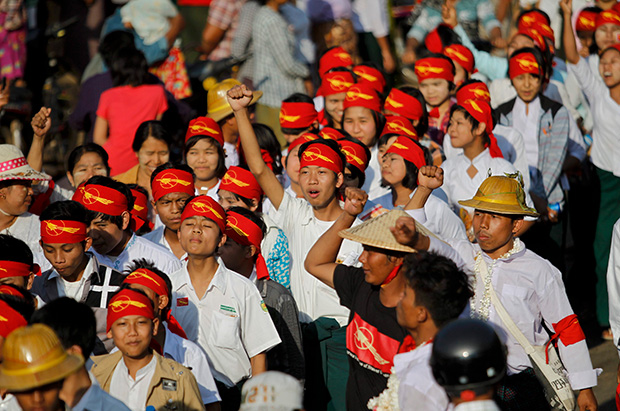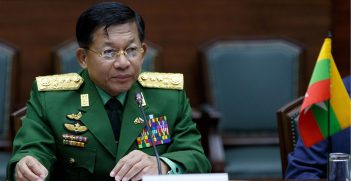Student Activism and Myanmar’s Revolution

The Military coup in Myanmar has sparked large-scale protests and activism, with the nation’s students taking front row action. How can Australia support Myanmar’s students through this?
The February 2021 attempted military coup in Myanmar has been catastrophic for the country. Military elites tried to wrest power from Aung San Suu Kyi’s elected National League for Democracy (NLD) government. Yet the military have failed to gain effective control of the country. Widespread conflict continues, and banking, health and education systems under the military’s control have collapsed or are under severe strain. It is therefore a failed coup d’etat by the Burmese military. The initial street protests and opposition to the military around the country have now evolved into a multi-pronged opposition known as the Spring Revolution, and many ethnic minority groups also continue their armed struggles against the military, particularly in the country’s border areas. Elected civilian members of the previous parliament – who were ousted in the coup – formed a National Unity Government (NUG) which now operates in parallel to the military’s State Administrative Council (SAC) and claims to be the legitimate government of Myanmar.
Myanmar student responses to the coup
The attempted coup has profoundly affected Myanmar’s university students, with hundreds of thousands not completing their degrees in the last two years. Enrolment numbers are down by 70 percent compared to pre-coup, with most university students refusing to attend regime-run universities as part of the Civil Disobedience Movement (CDM). A small segment of Myanmar students have taken advantage of the opportunities presented by military-aligned universities and institutions, yet the majority have assumed proactive roles, leading and organising a diverse array of activities aimed at overthrowing the military junta and restoring democracy in Myanmar.
Their activities have encompassed a spectrum ranging from protests to armed struggle. For the first three months after the coup, peaceful protests across the country were often led by students. Regions outside the main urban centres continue to witness small-scale protests as part of their ongoing resistance efforts. Students have also led other diverse forms of non-violent resistance including nationwide silent strikes, employing the symbolic act of banging pots and pans.
CDM students have also organised and joined online educational programs for further education, such as Burma Academy and Spring University. Some have also found opportunities to study abroad while also engaging in activities supporting the Spring Revolution. For example, many Myanmar students in Australia have engaged in political activism over the last two years, including lobbying the Australian parliament and building support for the NUG. This activism by students in Australia has also come at a cost, with many unable to safely return to Myanmar.
After April 2021, other student protesters were compelled to join armed struggle as a last recourse. Two primary factors precipitated the decision for these students to take up arms. The first factor was the military’s employment of live ammunition against peaceful protesters along with many extrajudicial killings at detention centres. The second was related to the introduction of new legal provisions allowing for the detention of those in opposition to military rule. Those provisions, implemented by the military’s State Administration Council, are intended to criminalise peaceful protesters, and people suspected of opposition can face a prison term of up to 20 years. Students who have taken up arms against the military have joined ethnic armed organisations, People’s Defense Force’s (PDF) – which are under the command of the Ministry of Defense of the NUG – and Local Defense Forces (LDFs) established within various regions across the country.
Students’ involvement in the movement can also be seen in other revolutionary activities.
Student bodies, including the All Burma Students’ Democratic Front (ABSDF) and the Student Unions Representing Committee (SURC), have been part of the establishment of the National Unity Consultative Council which aims to overthrow the military dictatorship and build a federal democratic union in Myanmar. Students also contributed as part of broader CDM support teams, and have extended assistance to PDF or LDF-led missions teams. Students have formed groups dedicated to documenting human rights abuses committed by the military and have also engaged in fundraising efforts to aid locally displaced individuals. Further, students often act as public educators, disseminating information about concepts of federalism and democracy to communities in non regime-controlled areas. They also manage local media outlets, disseminating news about the ongoing struggle against the military.
Australia’s support to Myanmar students
There are several ways in which the Australian government can support the struggles of Myanmar students in this time of extreme repression. To begin, there are hundreds of Myanmar students at Australian universities who have been overtly involved in activism and protests against the military regime. For many of them, returning to Myanmar will present significant dangers to their safety if they have been identified as pro-revolution activists. Extending their visas to allow them to stay in Australia, until viable options of return are possible, is crucial.
Second, in this time of instability, the Australia government should ramp up its Australia Award scholarships program to allow online and on campus opportunities for a wider number of Myanmar students. Supporting study in strategic areas of policy, health, economics, and development will be crucial in building governance capacity, especially for when wider opportunities for national rebuilding arise.
Finally, the Australian aid program in Myanmar can expand its support for in country civil society initiatives aimed at education for young people. Youth empowerment and community resilience programs are crucial, and also feasible, in this time of revolution. Building participatory and democratic civil society-led programs will be valuable in empowering students to take leadership roles.
Students have played an extraordinary role in Myanmar since the 2021 coup – from leading protests and the civil disobedience movement, to providing humanitarian assistance and leading resistance forces. The voices of these young people should be central in decision making about a new federal democracy in Myanmar. Australian government support to students at this time will have valuable long term impacts which will benefit both Myanmar and Australia.
Soe Htet is a doctoral candidate in political science at the University of Melbourne
Dr Tamas Wells is Coordinator of the Myanmar Research Network at the University of Melbourne. His research focuses on contested meanings of democracy, human rights and accountability in Southeast Asia, and impact on development policy.
This article is published under a Creative Commons License and may be republished with attribution.





